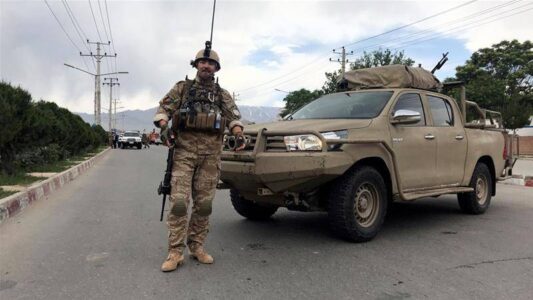
Terrorist attacks surge in Afghanistan as the US army withdraws
Even by its own standards, Afghanistan has seen a horrifically violent few weeks. Nearly 400 security forces and civilians were killed in April, according to New York Times data the largest monthly total since November 2020. And the violence appears to be getting worse: Nearly 200 people were killed during the first week of May alone, including students killed near their school this week in the worst attack in 2021 so far.
On April 30, a car bomb near a guesthouse in Logar province killed 27 people, many of them high school students. On Sunday, a roadside bomb ripped through a passenger bus in Zabul province, killing at least 11 people. And last Saturday, the country suffered its deadliest terror attack in months when a blast outside a school in Kabul killed 85 people, most of them young girls. With dozens more injured, the death toll is expected to rise.
Increasing violence is not a new trend: The number of civilian casualties in Afghanistan has increased in the last year, and the last six weeks have been especially brutal. What makes these attacks even more terrifying is no group has claimed responsibility. The Taliban and the Islamic State are possible candidates as are other actors trying to disrupt the already troubled peace process. Many Afghans have taken out their anger on the government for not protecting them discontent that benefits insurgents and others seeking to undermine Kabul.
The surge in violence won’t change U.S. plans to withdraw all troops in Afghanistan by Sept. 11 at the latest and possibly as soon as early July. On Monday, State Department spokesperson Ned Price confirmed the plans are on track, and U.S. President Joe Biden has justified his withdrawal decision by citing the diminished terrorist threat to the United States. Relentless attacks on Afghans, horrific as they are, will not affect the U.S. exit strategy.
The only conceivable scenario that could delay the U.S. drawdown is if Taliban fighters turn their guns onto U.S. troops. The Taliban have largely held their fire since signing a deal with Washington last year. And although the insurgents have threatened to attack U.S. forces for overstaying that accord’s May 1 withdrawal deadline, they haven’t followed through likely because they know the drawdown will soon be completed.
As a result, the United States will pursue a cease-fire or other violence-reduction arrangements even as it continues its withdrawal. Washington hopes to secure a major concession from the Taliban, but the U.S. troop presence is its most potent tool of leverage. Skeptics might liken the strategy to trying to ride a bicycle with no wheels. Moreover, violence is the Taliban’s most potent form of leverage, and the group won’t relinquish it for long.
Recent days have brought new opportunities to lessen the violence, but each has limits. The Taliban announced a three-day truce to coincide with Eid al-Fitr, from May 13 to May 15. Even a brief extension of the truce, which insurgents haven’t previously granted, could bring some much needed relief to Afghans and inject momentum into a floundering peace process. The best hope of getting insurgents to reduce violence and lay down their arms is to exploit their desire for recognition.
This is already a common theme in U.S. public messaging. (The first day of the Eid truce was not free of violence. Four separate bomb attacks were reported on Thursday, with at least 11 civilian deaths.)
Additionally, the United States and Britain are trying to broker a new security agreement between Afghanistan and Pakistan, according to Zalmay Khalilzad, the U.S. special envoy for Afghanistan reconciliation.
An Afghanistan-Pakistan security accord would entail each side preventing militants from staging cross-border attacks. Khalilzad mentioned the plan in a Der Spiegel interview on Monday, when Pakistani Army Gen. Qamar Javed Bajwa and British chief of defense staff Gen. Nicholas Carter met Afghan President Ashraf Ghani in Kabul.
Admittedly, enforcing such an accord would be difficult. Pakistan and Afghanistan have a tense relationship and share a porous, disputed border. The proposed agreement also wouldn’t address the tens of thousands of Afghan Taliban fighters based in Afghanistan. But it could modestly ease violence by reducing the number of militants entering Afghanistan from Pakistan.
Furthermore, Pakistan’s close ties to the Taliban make it a key player in the peace process, and a new Afghanistan-Pakistan accord could boost those efforts. With Afghanistan brought to its knees by the latest violence, any conciliatory step could be a good thing.
Source: Foreign Policy





